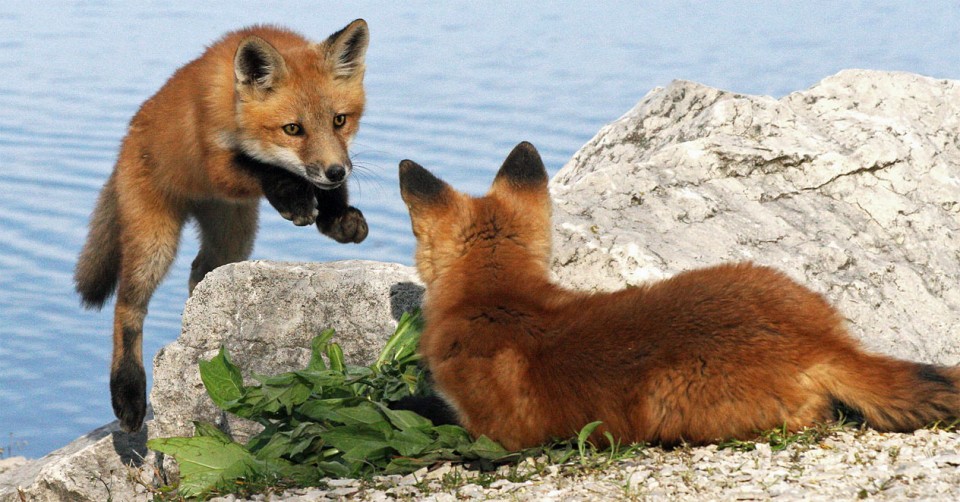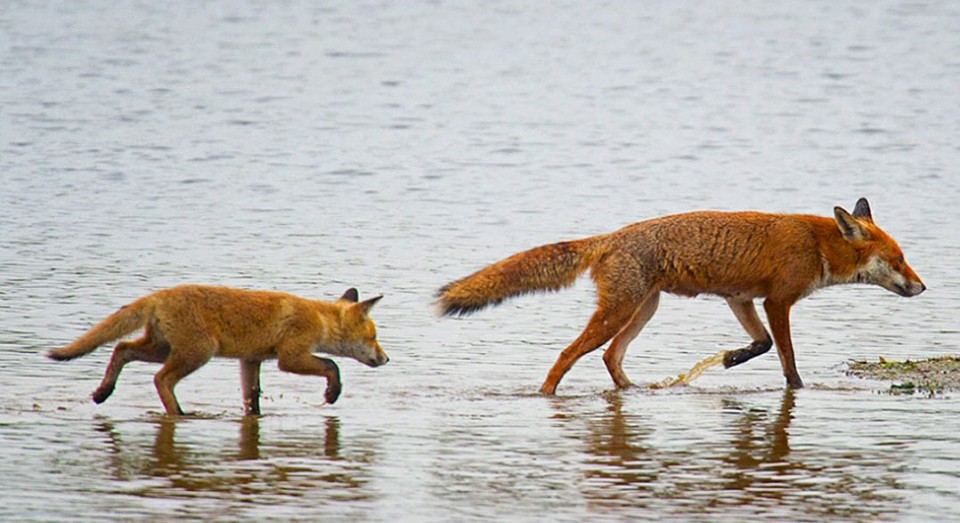Red Fox Breeding - Schooling the cubs
Over the years there has been much discussion about whether foxes teach their cubs where or how to hunt. Some authors suggest that, although cubs sometimes follow adults on hunts and may learn good spots to find food, the adults do not actively teach them how to hunt. In the Fox UK booklet that accompanied the May 2007 issue of BBC Wildlife Magazine, Stephen Harris remained cautious, writing that cubs "get little hunting training from their parents". This has not, however, been the impression by many other fox watchers and rehabilitators.
In a 1980 paper, David Macdonald described how a vixen seemingly taught her cub how to hunt worms, and how to tease them from the soil so as not to snap them in half (see Food & Feeding). Bridget MacCaskill, in her book The Blood is Wild, was also under the impression that parents teach their cubs how or where to hunt, although this may not be entirely necessary -- when she placed the cubs she was fostering into an outside enclosure they immediately started catching voles, without having the experience of an adult to show them what to do. MacCaskill also described how a male cub quickly adapted to life in a nearby forest, learning to hunt and fend for itself without any training, after it was accidentally released.
In the Fox UK booklet, reader Elaine Howard from Cheshire described a dog fox teaching one of his cubs how to pick up an egg, while Channel 4's Foxes Live series (broadcast in May 2012) filmed a vixen bringing a live bird back to the earth for the cubs, possibly to provide the opportunity for them to practice their hunting skills. Veteran fox watcher and rehabilitator Mike Towler has regaled me with many similar stories of his foxes teaching their cubs how to hunt, with tug-o-war games and burying food for them to find. Similarly, Eric Ashby noted, in My Life with Foxes, that his vixen started burying food for the cubs to find when they reached about six weeks old.
In his book, Free Spirit, Michael Chambers described many instances where the vixen (Ferdi) he hand-reared from a cub taught her offspring how to hunt. I highly recommend the book to anyone interested in fox behaviour, but Chapter 21 ("Progress for the cubs") is particularly interesting in this respect. There is too much in the chapter to recount here, but I want to briefly cover the main points.

Chambers observed that Ferdi's behaviour suddenly changed and she was no longer willing to just hand food over to the cubs: she started blocking access to the feeding plate; walking around the enclosure with her mouth crammed with food that she would only release after a tug-o-war with the cubs bundling at her feet; she presented whole items (rabbits and pigeons) and left the cubs to work out what to do with them, before collecting it and breaking them up for them. As Chambers explained:
"... Ferdi began to introduce [the cubs] to the idea that food did not merely appear every time they were hungry, but had to be worked for and searched out; that those who worked hardest and searched most diligently were the ones that ate most frequently."
The most interesting observations that Chambers made were as he watched Ferdi and her cubs in his meadow through binoculars from his shed roof. The cubs would stop their play when they noticed Ferdi starting to hunt and initially when she pounced they'd rush over for a titbit. Ferdi then altered her routine, snapping the victim but leaving it in the grass for the cubs to retrieve -- they'd rush in looking for a free handout but find none and start excitedly nosing in the grass. Later in the day she changed tactics again; she would pounce to collapse the gallery around the rodent but leave the cubs to excavate and dispatch the victim. After this, Ferdi just laid down and let the cubs practice. After some time searching, the cubs would practice their pouncing but merely flopped down splayed with their forelegs splayed in the grass, without the impact to collapse the tunnel and trap their target. Chambers writes:
"There was no individual coaching. It was squad training, but seemed to have the advantage that she was teaching the brightest member, and this was not always the same individual. Whichever one seemed to make most progress in a particular respect, was quickly copied by the others."

Chambers' observations of Ferdi's behaviour are perhaps all the more remarkable because Ferdi was herself an orphan, raise from a tiny cub and never had the benefit of being shown how to hunt.
All these observations tell us two things: foxes do not need to be taught how to hunt in order to become proficient in catching prey, but it probably helps; and the urge to teach one's cubs how to hunt appears to be instinctive and not something learned in turn from parents.